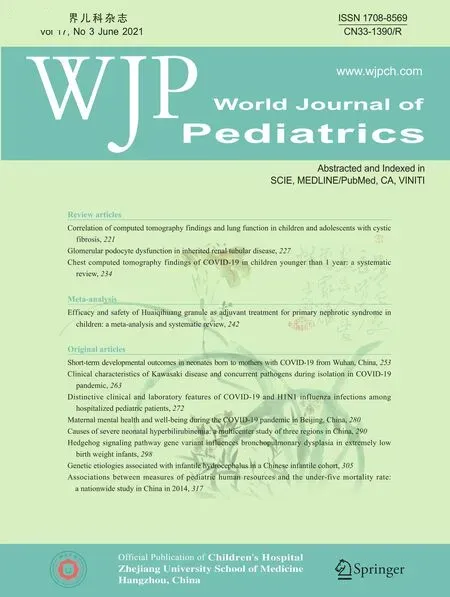Characteristics of abnormal serum creatine kinase-MB levels in children with COVID-19
Juan-Juan Wang· Zhao Hu· Jian-Ying Chen
Severe acute respiratory syndrome coronavirus 2 (SARSCoV-2) targets angiotensin-converting enzyme-2 on host cells and attacks various tissues including the heart and vasculature [1, 2].Increasing evidence has shown that considerable numbers of patients with coronavirus disease 2019 (COVID-19) suffer from cardiovascular injury [3, 4].Creatine kinase-MB (CK-MB) is mostly found in the myocardium and is a diagnostic marker for myocardial damage [5].Here, we conducted a retrospective study of children with COVID-19 that were hospitalized in Wuhan Children's Hospital from 26 January to 24 March 2020.We described the epidemiological and clinical characteristics of infected children with normal or elevated levels of serum CK-MB in Wuhan during the early stage of the COVID-19 pandemic.Laboratory measures were obtained 1-2 days after hospitalization.
Of 243 pediatric patients, 103 (42.4%) cases were identified with elevated levels of serum CK-MB.The mean age of patients with elevated CK-MB was 39.4 months, whereas the mean age of children with normal serum levels of CK-MB was 110.6 months.A higher proportion of younger children had elevated CK-MB (64.1% vs.8.6% under 3 years old,P< 0.001).Regarding symptoms in the two groups, 89.3% of patients with elevated CK-MB had fever or cough compared with 51.5% of patients with normal serum levels of CK-MB having fever or cough.Patients with elevated CK-MB were more likely to have gastrointestinal symptoms (17.5% vs.5.0%,P= 0.0016).Laboratory test data further confirmed that COVID-19 patients with elevated CK-MB were more likely to have liver damage (47.6% vs.11.4%,P< 0.001) and pneumonia complications (67.0% vs.40.7%,P< 0.001) (Table 1).
Pediatric patients with elevated CK-MB presented higher numbers of white blood cells (6.932 ± 0.176 vs.8.182 ± 0.311 × 10 9 /L,P< 0.001) and lymphocytes (2.661 ± 0.082 vs.4.147 ± 0.203 × 10 9 /L,P< 0.001) and higher serum levels of cytokines [interleukin (IL)-6: 5.106 ± 0.491 vs.12.810 ± 3.195 pg/mL,P= 0.0034; interferon-γ (IFN-γ): 3.731 ± 0.478 vs.6.050 ± 1.028 pg/mL,P= 0.0232].B lymphocyte counts in children with elevated CK-MB were approximately twofold higher than those in patients with normal serum levels of CK-MB (569 ± 33 vs.1019 ± 78 × 10 9 /L,P< 0.001).The duration of viral shedding from symptom onset to negative of RT-PCR test on nasopharyngeal swabs was shorter in children with elevated CK-MB (16.540 ± 1.049 vs.13.850 ± 0.648 days,P= 0.0254) (Table 1).
Although the infection rate of SARS-CoV-2 has been lower in children than in adults [6], an increasing number of pediatric cases have been confirmed worldwide in this ongoing pandemic.Cardiovascular complications are related to adverse clinical outcomes of adult COVID-19 patients, and myocardial damage is strongly associated with the increasing mortality of these patients [7, 8].However, the features of children with COVID-19 who suffered from myocardial injuries have seldom been reported.Here, we showed that 42.4% of pediatric patients with COVID-19 had abnormally high levels of serum CK-MB, which was consistent with Wang et al.'s report [8].CK-MB is predominant in the myocardium but not in skeletal muscle and is the secondary substitute for troponins as a marker to diagnose acute myocardial infarction.As such, an increase in serum CK-MB may suggestthe possibility of myocardial damage by SARS-CoV-2, and additional investigation of cardiac biomarkers and functions should be performed.Our results also demonstrated that pediatric patients with abnormal levels of serum CK-MB experienced a higher immune response, as they exhibited higher levels of cytokines, such as IL-6 and IFN-γ, and great numbers of immune cells, especially including CD3, CD4 and CD8 T lymphocytes and CD19 B lymphocytes.Hyperinfl ammatory cytokine storms are considered to play a key role in the disease process of COVID-19 [9].Aggressive infl ammatory responses strongly lead to injury of healthy cells adjacent to the site of infection, which further exacerbates organ damage caused by the elimination of infected cells [10].This effect might be one potential reason that pediatric COVID-19 patients with elevated serum CK-MB more frequently experienced impairment of multiple organs, including the heart, liver and gastrointestinal tract as shown by elevated function biomarkers or corresponding symptoms.However, lymphocytes, including T cells and B cells, play critical roles in the antiviral immune response, and a higher immune response may also result in a shorter duration of viral shedding, as shown in the patients with elevated levels of serum CK-MB.
In conclusion, elevated serum CK-MB might indicate more organ damages and a higher immune response in children with COVID-19, so additional monitoring should be conducted on these patients with abnormal serum CK-MB levels.
AcknowledgementsWe thank the computer center of Wuhan children's Hospital for its support and also thank Wei Li, Xing-Hua Liu, and Yun-Qiao Li from Union Hospital, Tongji Medical College, Huazhong University of Science and Technology for helping complete this project.
Author contributionsWJJ and HZ contributed equally to this work.WJJ collected the clinical data, conceptualized and designed the project, drafted the manuscript, and analyzed the data.HZ collected the clinical data and analyzed the data.CJY had full access to all of the data in the study and take responsibility for the integrity of the data, and revised the manuscript for important intellectual content.All the authors read and corrected the manuscript and approved the final version.
Compliance with ethical standards
Ethical approvalThe study was carried out in accordance with the Declaration of Helsinki and approved by the Ethics Commission of Huazhong University of Science and Technology.
Conflict of interestThe authors have no confl ict of interest to declare.
 World Journal of Pediatrics2021年3期
World Journal of Pediatrics2021年3期
- World Journal of Pediatrics的其它文章
- COVID-19 ocular findings in children: a case series
- Associations between measures of pediatric human resources and the under-five mortality rate: a nationwide study in China in 2014
- Genetic etiologies associated with infantile hydrocephalus in a Chinese infantile cohort
- Hedgehog signaling pathway gene variant influences bronchopulmonary dysplasia in extremely low birth weight infants
- Causes of severe neonatal hyperbilirubinemia: a multicenter study of three regions in China
- Maternal mental health and well-being during the COVID-19 pandemic in Beijing, China
